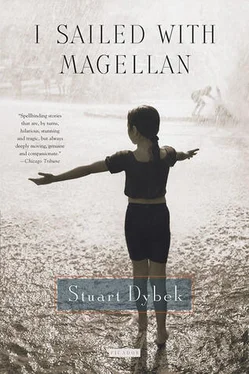Stuart Dybek - I Sailed with Magellan
Здесь есть возможность читать онлайн «Stuart Dybek - I Sailed with Magellan» весь текст электронной книги совершенно бесплатно (целиком полную версию без сокращений). В некоторых случаях можно слушать аудио, скачать через торрент в формате fb2 и присутствует краткое содержание. Год выпуска: 2004, Издательство: Farrar, Straus and Giroux, Жанр: Современная проза, на английском языке. Описание произведения, (предисловие) а так же отзывы посетителей доступны на портале библиотеки ЛибКат.
- Название:I Sailed with Magellan
- Автор:
- Издательство:Farrar, Straus and Giroux
- Жанр:
- Год:2004
- ISBN:нет данных
- Рейтинг книги:4 / 5. Голосов: 1
-
Избранное:Добавить в избранное
- Отзывы:
-
Ваша оценка:
- 80
- 1
- 2
- 3
- 4
- 5
I Sailed with Magellan: краткое содержание, описание и аннотация
Предлагаем к чтению аннотацию, описание, краткое содержание или предисловие (зависит от того, что написал сам автор книги «I Sailed with Magellan»). Если вы не нашли необходимую информацию о книге — напишите в комментариях, мы постараемся отыскать её.
story writer Stuart Dybek returns with eleven masterful and masterfully linked stories about Chicago's fabled and harrowing South Side. United, they comprise the story of Perry Katzek and his widening, endearing clan. Through these streets walk butchers, hitmen, mothers and factory workers, boys turned men and men turned to urban myth.
solidifies Dybek's standing as one of our finest chroniclers of urban America.
I Sailed with Magellan — читать онлайн бесплатно полную книгу (весь текст) целиком
Ниже представлен текст книги, разбитый по страницам. Система сохранения места последней прочитанной страницы, позволяет с удобством читать онлайн бесплатно книгу «I Sailed with Magellan», без необходимости каждый раз заново искать на чём Вы остановились. Поставьте закладку, и сможете в любой момент перейти на страницу, на которой закончили чтение.
Интервал:
Закладка:
“Once, after a terrible argument with Jimmy,” Mirza said, “I felt so bad I went to see the santero. It was something I hadn’t done since high school. It’s supposed to be private, like confession, but when I came home Jimmy wouldn’t leave me alone until I told him what the santero said. So, finally, I broke down and told him: ‘You are living with a man cursed by his father.’ That’s what the santero told me. And when I told Jimmy that, it was like I’d stabbed him in the gut, and then he began to laugh that crazy laugh and he became like happy, and he said, ‘Now I understand.’”
“Qué quieres?” the Disciple demands. Though he’s taken only a few drags, he drops his lit cigarette and grinds it beneath his high-topped basketball shoes.
“Just wanted to walk around the old hood,” Mick tells him in Spanish, “check out our old building, take a look at the back yard where we used to play. You know that oil shed back there? My old man built it out of scrap wood we stole after urban renewal bulldozed a square block on Cermak and Western. I saw there’s a big Jewel on that corner now. Me and my bro used to sneak out after supper and smoke behind that oil shed. It was our secret place. But it really pissed us off when our father first built it because that little back yard had been our baseball field, you know, when we were small and couldn’t hit a ball farther than we could spit. It seemed as big as Sox Park to me then. A home run was over Kashka’s fence. You guys probably never heard of Kashka. See that parking lot next door? It used to be a falling-down old house surrounded by a wooden fence where this crazy, fat woman named Kashka Marishka lived. She kept chickens even though it was illegal. Her fucken rooster would wake us up every morning—”
It’s too long a story to tell them now, even for my brother, who can talk nonstop all night, but he’s remembering Kashka’s old house, and how the cops had to come the day it was scheduled to be wrecked in order to tear Kashka away from its warped rooms. Her enormous body bulged through rips in the slip she was wearing. She was cursing in English and Polish, weeping and screaming and fighting the cops, while a bulldozer mowed down her crooked home-run fence, and her chickens flapped a getaway down the alley with the cops in pursuit. Mick remembers watching the spectacle with the rest of the neighborhood, and feeling sorry and ashamed, knowing it was Sir who’d finally bribed the alderman to get Kashka’s house condemned.
“Qué quieres?”
It was Sir who bribed the cops to keep an arrest off Mick’s record after Mick was clubbed and detained when an antiwar rally he’d helped organize in his freshman year at Memphis State turned into a riot. Our father drove a bloodied Mick from the police station to a deserted industrial lot that overlooked the Mississippi. There, he told Mick that all his life he’d lived with the dread that “the family curse,” the madness responsible for his own father’s incarceration in a state mental hospital, would be inherited by his sons. Then, our father apologized to Mick for passing it on to him.
It was Sir who gave Mick’s address on St. Philip Street in New Orleans to the FBI.
Two feds in suits and ties showed up at the house in Memphis looking for Mick. He’d dropped out of Memphis State, lost his student deferment, and was evading the draft. Not just evading the draft but sending his draft board a steady stream of antiwar literature — posters of Che Guevera, the poems of Ho Chi Minh, all of which were by law required to be kept in his file. One of the agents said to Sir that it must be sad to no longer hear from his runaway son, and Sir replied that sure he heard from Mick, he’d received a letter just the other day. The agents told him they’d have to confiscate the letter, and he handed it over. On the envelope was Mick’s address in New Orleans.
As letters go, it wasn’t particularly incriminating:
Dear Folks, Don’t worry that you haven’t heard from me. I was in Mexico. Now I’m back here, doing okay. Got a job cleaning ships. The food in this town is sure good.
Peace, Mick
Mick was in bed with a nun when the FBI broke down his door, which was unlocked, and stormed in with guns drawn. They made Mick and the nun lie facedown and naked on the floor while they cuffed Mick. The nun — her name was Sister Claudia — was in the process of leaving her order. Mick had met her at a protest rally. U.S. marshals took Mick to the New Orleans Parish Prison, where he was thrown in with the general population. He was twenty-one, blond, and really did bear a resemblance to the dead actor James Whatshisface.
I didn’t know what had happened until several days later, when I got a message to call a Sister Claudia, whom I’d never heard of. I was teaching at a junior high in the Caribbean; I’d finally made it from Blue Island Avenue to a real blue island. She’d had a hard time tracking me down.
“You have to get him out,” Sister Claudia pleaded on the phone. “His cell mate, who’s in for murder, is a psychopathic weight lifter covered in Klan tattoos. Mick’s fighting for his life every night in there. They broke his nose, they knocked out one of his front teeth.” She began to cry.
I telephoned our father immediately.
“A little time in there might straighten him out,” he said.
“Are you nuts? Do you know what goes on in prison? They’ll gang-rape him.”
“What the hell are you talking about?” he said.
“Don’t you know what happens in prison to young guys, Dad?”
Then I realized he didn’t know, or didn’t want to. I pictured him after dinner sitting before the TV, Mammy darning socks while he pondered his monthly issue of Forbes , calculating market forces for investments he never made. And then, although the events weren’t connected, I recalled how, long ago, when he was told by the nuns that, given his IQ scores, Mick should be sent to a special school, our father became alarmed. He thought they were talking about reform school.
“It’s true what I’m telling you,” I said. “Look, I can’t do anything from here, but I’ll fly in and get him a lawyer.”
“What’s wrong with you guys?” he asked. “I don’t understand my own sons. If it ain’t one mess, it’s another.”
One mess or another — an expression we’d been raised with, not that it applied strictly to Mick and me. When our father was hospitalized, bleeding internally and awaiting exploratory surgery, I called from the airport, on my way to Memphis, and asked, “How you doing, Dad?” and he answered, “I’m in kind of a mess here, sonnyboy.”
I didn’t have to return to the States to try to get Mick out of prison. After talking to me, Sir packed a suitcase, got in his gold Chrysler, and drove in the middle of the night to New Orleans. He hired a lawyer and had Mick out two days later, then took Mick to the dentist and got him a new front tooth.
“Qué quieres?” the Disciple demands.
The kid hasn’t indicated that he’s understood one word Mick has said in Spanish, but now he makes a gracious gesture toward the gangway, inviting Mick to step into it and visit the back yard he’s been describing. Mick glances toward the gangway — a narrow, shadowy corridor between apartment buildings. At the end, bounded on three sides by the brick walls of apartment buildings, a square of trampled mud is crosshatched by shadows of clothesline and power wires. It’s the patch of earth Mick has come here to stand on again. He can still predict the angles of ricochets off the brick wall of the building next door, whose mortar was knocked loose years ago by the countless hours of pounding he gave it with a rubber ball. And down the crumbling, cobwebbed basement steps that smell of leached lime, he knows by heart the recesses where spiders, rats, and alley cats harbor their wildness in the musty darkness. Behind the oil shed Sir built, under the rafters, are caches where we hid cigarettes and lighters, pints of muscatel the winos bought for us, dirty playing cards, illegal fireworks, a Wham-O slingshot and a bag of ball bearings with an affinity for factory windows, a throwing knife we’d practiced with on Kashka’s fence. He wonders whether any of our treasures are still hidden there. What might he remember standing in the back yard? He can visualize how the shadows of clothesline and hanging laundry are swallowed as the deeper shadows of the brick walls extend across the yard. It’s a place composed more of shadow than of earth. Shadows familiar enough to be recognized by their smell, the smell of a past that sometimes seems more real than the present, a childhood in which degrees of reality were never a consideration, when reality and the sense of identity that went with it were taken for granted. That unquestioned conviction as to who they are is the advantage the Disciples on the front steps have over him.
Читать дальшеИнтервал:
Закладка:
Похожие книги на «I Sailed with Magellan»
Представляем Вашему вниманию похожие книги на «I Sailed with Magellan» списком для выбора. Мы отобрали схожую по названию и смыслу литературу в надежде предоставить читателям больше вариантов отыскать новые, интересные, ещё непрочитанные произведения.
Обсуждение, отзывы о книге «I Sailed with Magellan» и просто собственные мнения читателей. Оставьте ваши комментарии, напишите, что Вы думаете о произведении, его смысле или главных героях. Укажите что конкретно понравилось, а что нет, и почему Вы так считаете.












